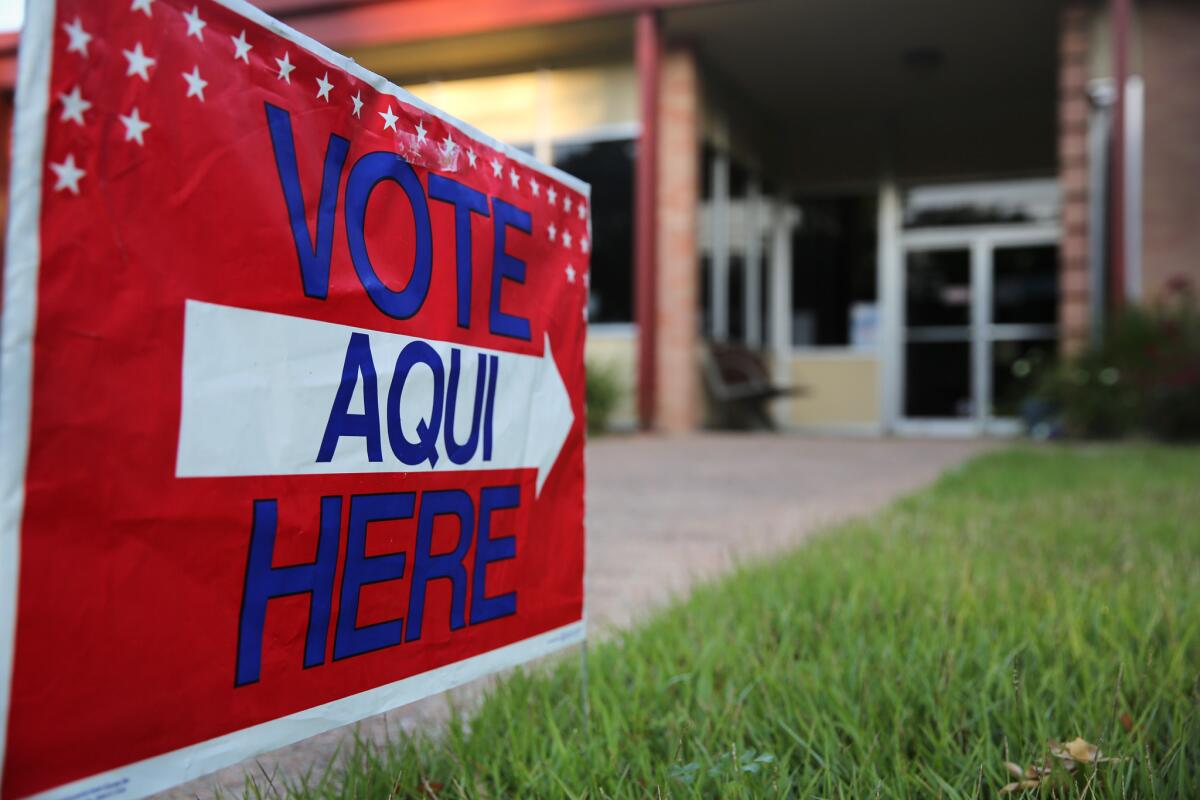Report shows Latinos are underrepresented in state, local government

A bilingual sign stands outside a polling center in Austin, Texas. In California, where Latinos now outnumber whites, low voter turnout results in underrepresentation of Latino elected officials in all levels of government, according to a study.
- Share via
A report released Thursday underscored how Latinos lag in holding elected office in California, even as they become the largest ethnic group in the state.
At a panel hosted by the Latino Legislative Caucus and the Leadership California Institute, lawmakers and Latino political experts grappled with the apparent contradiction of the growing Latino population bloc but stagnant number of political officials.
“While Latinos have surpassed 39% of the population of California, we have an atrocious voter turnout rate,” said Assemblymember Luis Alejo (D-Watsonville), the chairman of the Legislative Latino Caucus.
Low voter turnout results in underrepresentation of Latino elected officials in all levels of government, according to a new report commissioned by the Latino caucus. The discrepancy is particularly stark in local government, where Latinos comprise around 10% of county supervisors and almost 15% of city council members. In the Legislature, 12.5% of the state Senate and 23.8% of the Assembly are Latino.
Arturo Vargas, executive director of the National Assn. of Latino Elected and Appointed Officials, noted that a disproportionately high proportion of the Latino population is ineligible to vote, either because they are under 18 or are not citizens.
Still, he said, there are many eligible Latinos who do not vote, a group he called “the great unengaged.”
In focus groups conducted by his organization, Vargas said many Latinos reported not being reached by campaigns seeking their vote. He said that campaigns often focus just on reliable voters, to the exclusion of those who aren’t regularly active in politics.
“One of the structural problems we have in our democracy is that if you are not a likely consistent voter, you then are structurally excluded from the process,” Vargas said. “No one’s going to campaign for your vote if you’re not even registered to vote. And if you’re not registered to vote, but only voted once in the last six elections, you’re not going to be campaigned to by the candidate.”
Mike Madrid, a Republican strategist who is an expert in Latino politics, pointed to another reason for low participation: poverty.
He said that in cities where the poverty rate for Latinos is over 30 percent, “there is virtually no representation on city councils throughout the state.”
His research indicated a domino effect: As poor Latinos do not vote, Latinos are less likely to be elected to office.
“People do not engage in their government, even in the most limited ways, including voting, unless they feel they have a stake in it, and there’s an enormous swath of Latinos who don’t feel that they are engaged in California’s society,” Madrid said.
Assemblywoman Susan Talamantes Eggman (D-Stockton) said officials needed to do a better job conveying to their constituents why the goings-on of government matter in their lives.
“I see voting turnout as a symptom of something much larger,” Eggman said. “Voting is the end result of people who feel engaged. If you don’t feel engaged, if you don’t think it matters, why would you show up to vote?
Follow @melmason for more on California government and politics.
More to Read
Sign up for Essential California
The most important California stories and recommendations in your inbox every morning.
You may occasionally receive promotional content from the Los Angeles Times.











